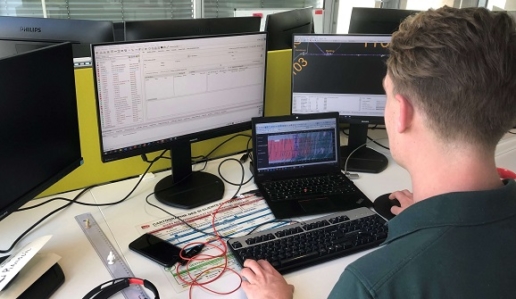Key figures
- 6 million daily train paths to be allocated
- 28,000 km of line
- 15,000 trains to manage every day
- 400 “timetablers” in charge of timetable production
Deploying new timetable production software
SNCF Réseau, the organization in charge of managing the infrastructure and train traffic for the French National Rail Network decided to replace its old timetable planning system (the THOR tool) with new software: the Industrial Timetable Production System (Système Industriel de Production Horaire – SIPH), based on a software suite, TPS, from Hacon. The purpose of this tool, which is central to SNCF Réseau’s business and that of the Capacity Allocation Department (Direction de l’Attribution des Capacités – DAC), is to plan, every year, the train paths to be taken by all trains on the French rail network. To achieve this, the tool directly factors in demands from national and foreign railway companies, as well as modeling the railway infrastructure precisely, including, in particular, scheduled maintenance work and issues linked to safety (known as conflict management).
As a result, by being better connected to SNCF Réseau’s other management tools, the new timetable production system now contributes to improving the routing and allocation of train paths, saves time on the construction of the annual transport plan, and reduces response times to customer demands.
For SNCF Réseau this new system involves a threefold challenge:
• improving the efficiency of timetable production and the train path allocation rate, and, as a result, customer relations;
• running more trains with complete confidence on safety, against a backdrop of a network opening up to competition;
• automating the production work of the timetablers in charge of the annual transport plan, so that they can focus on higher-value activities (especially analysis and resolution of conflicts).
A more efficient system fully adopted by its users
To carry out this vast transformation project and manage the adaptation of the software and its deployment, SNCF Réseau chose to partner with Wavestone to ensure initial use of the system by the end of 2020.
Wavestone’s first objective was to support the internal team in charge of the new system by identifying and framing the business needs – in terms of functionalities, data, and ergonomics. It was then a question of making sure these needs were properly expressed for the development teams and deciding between possible solutions, before managing the piloting, framing, and carrying out of test phases within the business. In parallel, a major challenge in the project was to onboard the 400 timetablers, the system’s future users – through dedicated change management and ensuring they took ownership of their new work tool.
Supporting a major transformation project during a pandemic
Beyond this support, SNCF Réseau valued Wavestone’s implementation of a continuous improvement process for the SIPH project and its application to develop the organizational model, tools, and procedures.
Being right in the middle of the Covid-19 pandemic, Wavestone also deployed a set of solutions and tools to better manage the project: remote daily updates on progress and feedback, visual management, key monitoring indicators, training of trainers and users, an e-learning platform, and others.
Wavestone received the full stamp of approval from SNCF Réseau, for its mastery of its commitments and deadlines, the quality of its advice and project management, and also for its prudent approach on budgets against a difficult economic backdrop.
Instead of the old diagrams in Excel, we now have a visual representation of tracks, buildings, switches, signaling equipment, etc. As the work windows are automatically integrated and positioned to the nearest kilometric point, a glance is enough to identify traffic affected by future maintenance operations. While waiting for other improvements, SIPH offers great potential to automate timetable production, improve customer relations, and operate at full capacity professionally!
Vanessa Rondeaux,
Works Scheduler at the South-East Capacity Design Center, DAC
Fixes have been deployed on a regular basis and we now have a transformed software: more responsive, more fluid, and more mature. Sharing the same software also has benefits in terms of culture. We now speak a common language and we can see that colleagues have a better understanding of our production constraints.
Sylvain David,
Local Manager, Timetable Adaptation, at the Hauts-de-France Regional Timetable Office




